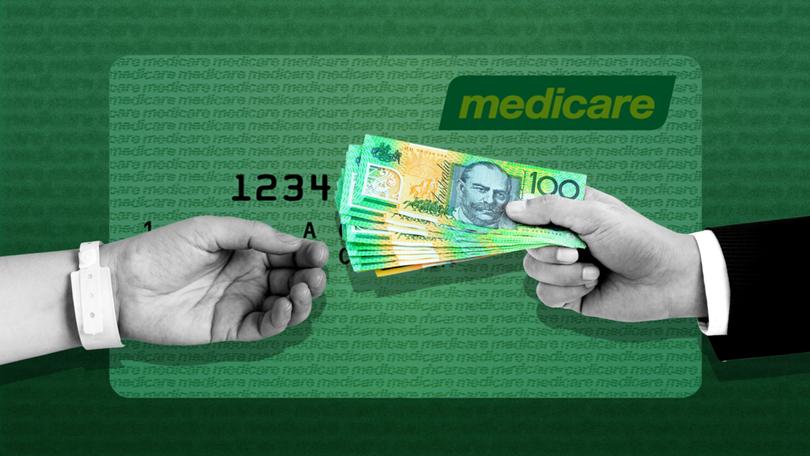Prime Minister Anthony Albanese’s Medicare policy is a wealth transfer from the well to sick
AARON PATRICK: The PM’s now-bipartisan Medicare policy could be the greatest expansion of government in the economy since the NDIS. And it will have huge consequences for everyone.

Anthony Albanese has been looking for a fight over Medicare pretty much since he became Labor Party leader in 2019. On the weekend, facing a tough election, he promised to reverse what had been the managed retreat away from almost-universal free medical care.
But Mr Albanese did not get the fight he wanted. The Coalition quickly matched the policy. But, amid great competition, the now-bipartisan policy may come to be seen as the greatest expansion of government interference in the economy since the out-of-control National Disability Insurance Scheme was born 12 years ago.
Giving almost everyone free access to general practitioners sounds great. GPs do not work for free, though, and the policy will function as a wealth transfer from the well to the sick.
Sign up to The Nightly's newsletters.
Get the first look at the digital newspaper, curated daily stories and breaking headlines delivered to your inbox.
By continuing you agree to our Terms and Privacy Policy.Some 22 per cent of GP consultations, in the second half of last year, required a modest patient payment. The system allows good doctors to earn more money, provides a disincentive for unnecessary visits, and reduces welfare for the affluent.
Under the new system, 90 per cent of all visits will be free. In some areas, doctors’ rebates will be doubled.
An unworthy beneficiary
One of the undeserving beneficiaries will be me. I saw my local doctor on Sunday for medicine that has to be closely monitored because it can cause liver damage.
The cost of the 70-minute consultation was $162, which is about the same as a skilled Sydney plumber charges. Medicare will refund two thirds of the cost.
A bulk-billing clinic nearby would have not cost me anything. But most of its doctors are old, or English is their second language.
They are, no doubt, skilled professionals. But Iike many Australians I prefer to discuss sensitive medical matters with a doctor I have known for several years. When the cost is to me is zero, I’ll probably see her more often.
A non-existing challenge
The new policy is fixing a problem that does not exist.
Anyone in Australia who is poor or very sick does not pay to see a GP.
About 48 per cent of people are always bulk-billed, which is when a GP’s bill is covered by the government. Another 24 per cent are “usually” bulk billed, according to Stephen Duckett, a pro-Medicare health expert at Melbourne University who described the decision as a “watershed” moment.
These already-high subsidies do not do justice to Medicare’s generosity. Because poor and elderly people see GPs more often, 78 per cent of GPs visits are free for patients.
The location of these zero-priced services are influenced, as they should be, by wealth. In working-class south-western Sydney, the rate is 81 per cent, according to Duckett. In affluent Canberra, the figure is around 23 per cent.
Mosman will not be abandoned
On Sunday, Albanese said: “This is a policy that lifts up our entire nation and ensures no one is held back, and no one is left behind.”
Because the Labor Party’s commitment to Medicare is one of its main campaign weapons, the government will ensure residents of Mosman, Toorak, Dalkeith, New Farm, Unley Park and other rich suburbs will not be “left behind” by having to pay $50 for medical treatment.
The Coalition knows the decision is bad policy and effective politics.
When he was health minister in 2003, future prime minister Tony Abbott gave Medicare more money for the poor and country residents. Inflation was allowed to eat away at subsidies for other people, an act of fiscal responsibility Abbott received little credit for.
Bad history
Eleven years later another Liberal health minister, Peter Dutton, tried to introduce a modest GP “co-payment” from those who could afford it.
The Senate vetoed the plan. The uproar contributed to Abbott’s removal from power.
Sensing power within his grasp, this history explains why Dutton feels compelled to support an $859 million annual healthcare subsidy - while his frontbenchers hint at cutting taxes and firing public servants.
The Labor Party will not stop claiming Dutton will “wreck” Medicare. Because of the weekend’s decision the media, mostly, will not buy the accusation.
As a consequence, though, whichever side wins will be committed to extra middle-class welfare in an economy awash with subsidies. Those who work will pay.
This is the legacy Albanese will leave Australia.

